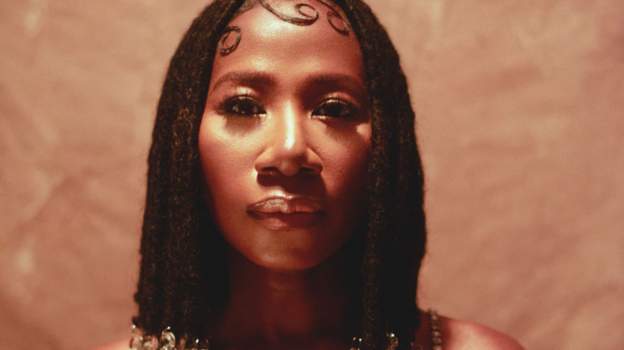Nigerian singer songwriter Asa tasted international success right at the start of her career when her debut album, Asa, went platinum in 2007.
Following on from that was tough she admits: "People still want that album after over a decade."
But more albums followed: Beautiful Imperfection, Bed of Stone, Lucid in 2019, and she's just dropped her fifth studio album entitled simply V (five).
Born in Paris, where her Nigerian parents were working and studying cinematography, her family returned to Nigeria when she was two.
She grew up in Lagos and returned to France 18 years later to study jazz and to begin her career as a recording artist.
"My father played a lot of music at home, and of course there was the church influence. But then as I grew, I started listening to soul music and jazz, and I think it was a combination of all of this."
But then her mum threw down a challenge, pointing out that Asa was singing all these other people's songs: "But who are you? How do we know who you are?"
"That was when I started to listen to the radio and try to do my own collaborations. Such and such a person featuring Asa... just to find my voice."
The new album V has a more electronic pop vibe compared to her previous one Lucid, which drew heavily on her experience as a woman.
"Lucid was a period where I was in a relationship, and it ended. That was such a new experience for me. And also I was learning more about life, growing up. Lucid was really about that experience."
Asa's new album has collaborations with The Cavemen, Amaarae and most notably Wizkid on the track IDG (I Don't Go).
"You know he's an amazing person. I've only met him a few times. But I think he's very kind. You know you could tell that from his heart. I enjoy his melodies. I think he's brilliant."
The new album was made in lockdown, which Asa quite enjoyed.
"Everything was quiet, you could hear the birds. It was a beautiful thing to see. Not the suffering of people but just the way the world was. There was such a newness. It just felt like the beginning. Lagos skies were blue for the first time in a very long time and the water was still."
Asa says it was also a time of introspection, fear and uncertainty with the coronavirus pandemic.
"Writing V was all of this, fear and excitement that I am injecting."
Writing in the Afrobeats genre has been a challenge for Asa because it's more of a vibe than writing songs in the traditional way.]
"It's less lyrics, but more groove. It doesn't make it bad.
"You just don't know how the songs come. I think that's why when you ask artists where does the inspiration come from, they say, 'Oh it came from God.' We're talking about Afrobeats here, it's groove. We're not talking about lyrics here.
"People want to forget. People want to enjoy. You know because that's all they have. Groove."
Latest Stories
-
Today’s Front pages :Tuesday, July 22, 2025
6 minutes -
Mahama thanks Eastern Region, unveils bold infrastructure plan
1 hour -
NPP will not release 2024 Election Report – Oppong Nkrumah
2 hours -
GUTA threatens mass protest over foreign intrusion in retail sector
2 hours -
Defence Minister announces $1bn retooling for Ghana Armed Forces
2 hours -
Togbe Afede reaffirms support for youth innovation at 2025 Asogli Forum
2 hours -
Political chess masters: 11 multiparty Ghanaian families playing all sides
2 hours -
Defence Minister assures fair and transparent GAF recruitment
2 hours -
Ghana Medical Relief to provide free medical care to 10,000 residents of Berekum
3 hours -
Trump threatens to block stadium build over name
3 hours -
Car maker Stellantis says US tariffs have cost it €300m
3 hours -
Taylor Swift and Drake music giant files to list on US stock market
3 hours -
‘We are not just looking for a flagbearer, we want a presidential candidate’ – Kyei-Mensah-Bonsu
3 hours -
Court denies bail to nine suspects in Nkwanta riots case
4 hours -
Libyan ICC war crimes suspect arrested in Germany
4 hours

